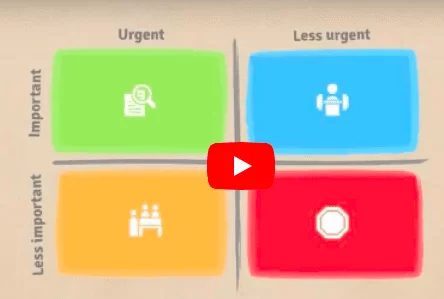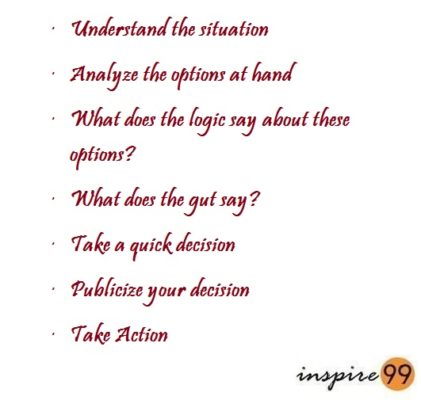How to stop procrastinating: Procrastination is the thief of time. Although I’ve read numerous articles about how procrastination is good, I still think that unless we actively manage time – this can cause severe stress. I like that procrastination gives us more time to build a new perspective on the things that we are doing. In that sense, this can be a benefit.

However, as time progresses, we realise that we have less time for the things that we thought of doing. It gives us less time to work on things that are most important to us thus causing enormous stress and compromising the quality of an output. In that respect, we must find ways to prevent procrastinating.
6 Steps to stop procrastinating and actively manage time
We can break down procrastination into several processes, however broadly, we can classify stopping procrastination into the following steps.
- Prioritise time into an Eisenhower Matrix
- Estimate time required for important and urgent tasks
- Plan your time for the task and create key milestones with metrics to measure success
- Give time for feedback and prevent perfection
- Create the first draft well before the deadline
- Finesse the task and make the final submission
These steps to stop procrastinating will work whether you are a student or in a work context. The best way to beat procrastination is through progress. All these steps quoted above talk about how to achieve progress and defeat the habit of procrastination.
A primary prerogative of this article is to ensure that any decision taken must have an action associated. These actions help you get through the initial inertia about starting a task. For more control on better time utilisation, I would refer to our article on Time Management PPT for a concise representation of managing time.
Prioritise time into an Eisenhower Matrix
This is time management 101. Our first step is to define the activities into urgent and important categories. The Eisenhower Matrix will create a visual picture of the various things demanding our time in the order of their priorities. Make sure that your time is reserved for the important and urgent tasks. The most important step in this process is to make sure that you identify your time wasters and manage them actively.

Estimate time required for important and urgent tasks
Once you prioritise and identify the most important tasks on your list, the next step is to estimate your work. Remember that this estimation will not be perfect but you’ll need an indicator about how long it will take. If you don’t have the right answer, at least identify whether it is a small, medium or a large task. Then compare it with the other tasks in your list. You’ll find a relative scale to give you an indication of the time required to complete it.
Plan your time for the task and create key milestones with metrics to measure success
This is the most important step to stop procrastinating. Most times we procrastinate because we think that the task is too big or challenging. However, the first step is about creating a plan and getting rid of these fears. Once we make a plan, we know realistically what the impact is. When you make this plan, ensure that you have a way of breaking it down into different stages of delivery.
Each stage must be measurable to give you an indication of how close you are to success. Unless you measure, you’ll easily fall into the stress of not being able to compare things. This will then lead you to the conflict between time and stress management which is never fun.
Smart goals for time management: https://www.forbes.com/advisor/business/smart-goals
Give time for feedback and prevent perfection
Once you know the various steps, you must ensure that you have time for feedback. The problem with waiting until everything is done is that there’s no time to work on feedback. Instead, take feedback on the milestones. It will allow you to not only prevent procrastination but also ensure that others are involved in your process. They will have the time and opportunity to have their say and this creates group work benefits as well. Take this feedback and build time to work through this feedback.
Create the first draft well before the deadline
Now, this is very important to prevent procrastination. Perfection is the enemy of progress. Make sure that you create a deadline well before the final submission. This way, even if you don’t make any more changes, you won’t risk complete failure. Use this time to ensure that you are finessing your outcome – take feedback from people and improve the final output. This ensures that you are constantly tinkering and getting it as close to perfection as possible. Don’t let the ego come in the way of remarkable progress that you can achieve.
Finesse the task and make the final submission
And finally, it is about the submission. After submission, make sure that you get feedback about the process you followed to stop procrastinating. Remember that this is a game of continuous progress and improvement. If you don’t improve, then you’re stuck and you lose the opportunity to become better with the process. Instead, use every piece of feedback you get to grow and learn new skills. This is how you’ll become excellent at managing time.

Pingback: You will never have time for anything, if you want time you must make it - Inspire99
Pingback: Either you run the day or the day runs you - Jim Rohn - Inspire99
Pingback: Better Three Hours Too Soon Than a Minute Late - Shakespeare - Inspire99
Pingback: 5 Steps on - How do I stop worrying? - Inspire99
Pingback: 4 Reasons to Read - Who Moved My Cheese! - Inspire99
Pingback: 4 Quadrants of Time Management - Eisenhower Matrix - Inspire99
Pingback: 8 Time Management Skills to Increase your Productivity - Inspire 99
Pingback: Inside The Mind of A Master Procrastinator - Inspire 99
Pingback: Sometimes the smallest step in the right direction meaning - Inspire 99
Procrastination is a serious problem and your tips help.
“A mirror to self ” suits better to this article :)
” A mirror to self ” best suits this article :)
How to stop procrastinating http://t.co/SUZr0ZIW7g